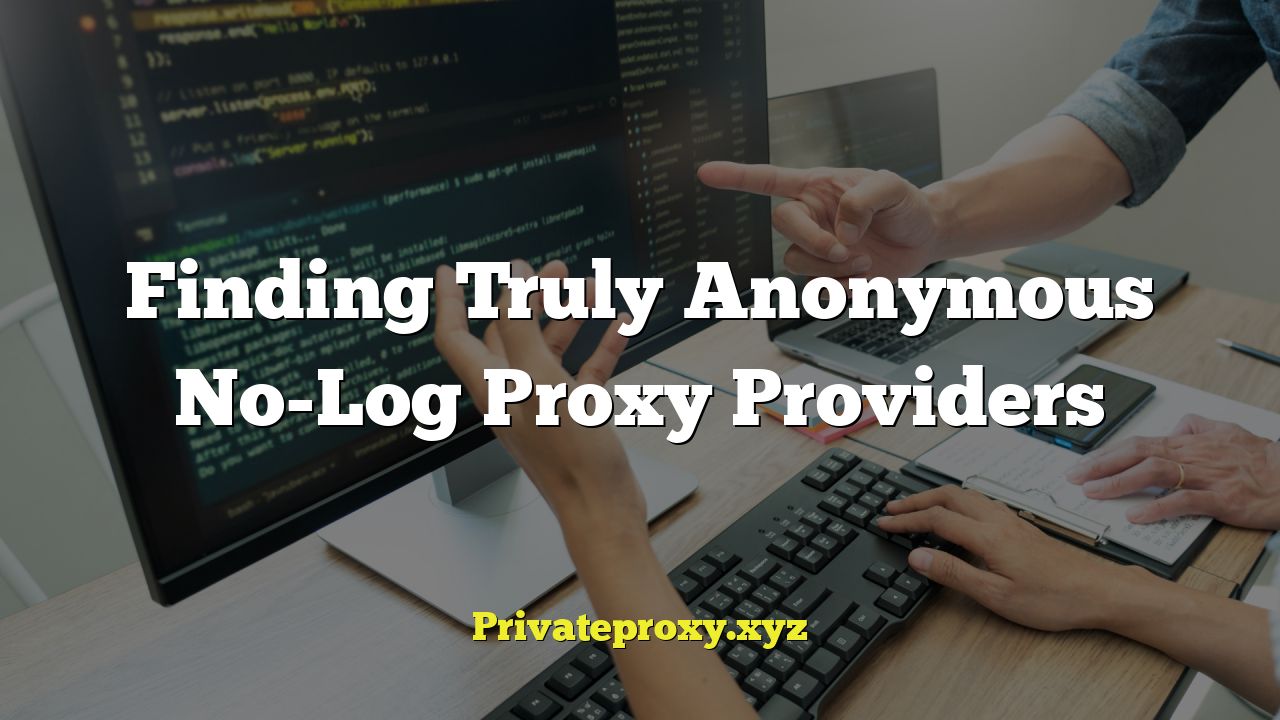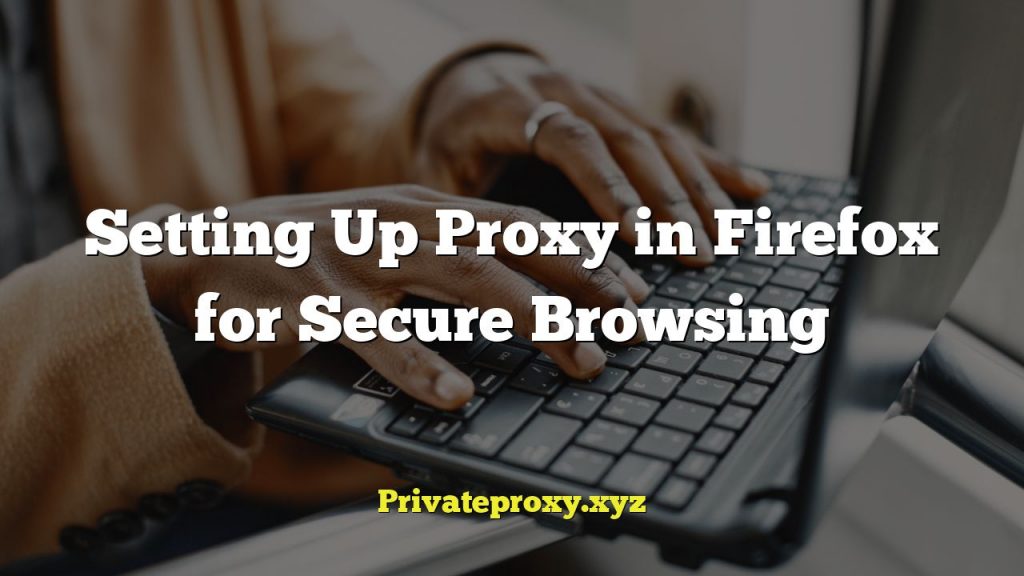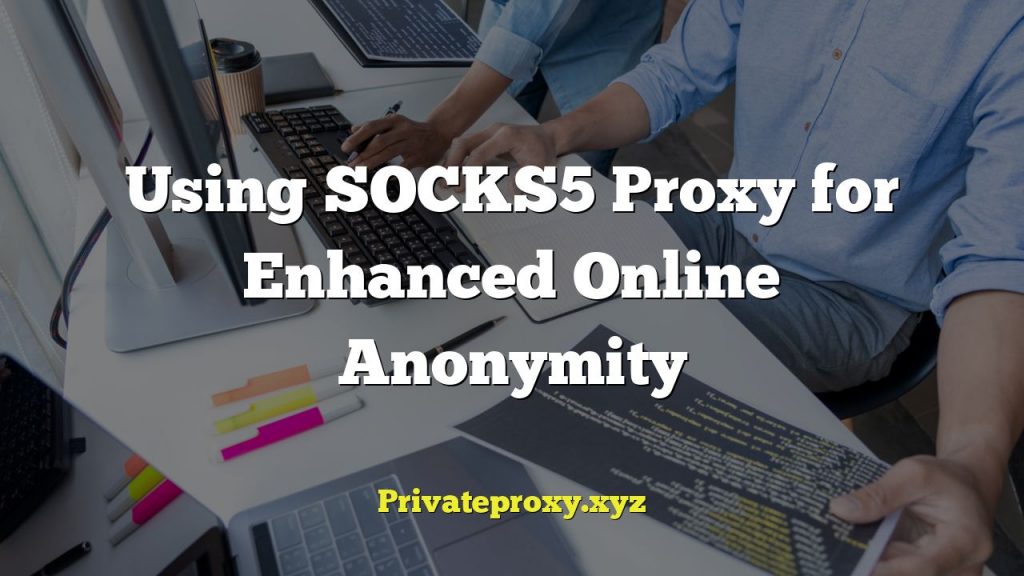
## Understanding Anonymity and Proxy Servers
Proxy servers act as intermediaries between your device and the internet. Instead of directly connecting to a website, your request is routed through the proxy server, which then forwards it to the website on your behalf. The website sees the IP address of the proxy server, not your actual IP address. This offers a degree of privacy, but the level of anonymity depends heavily on the proxy provider and their logging policies.
## The Myth of Complete Anonymity
It’s important to understand that achieving true anonymity online is extremely difficult, bordering on impossible. Even with the best no-log proxy, other factors like browser fingerprinting, cookies, and web trackers can compromise your privacy. Therefore, the goal is usually to minimize the amount of data that can be used to identify you, rather than achieving absolute anonymity.
## What are No-Log Proxies?
A “no-log” proxy provider claims not to store any records of your online activity. This means they shouldn’t keep logs of:
- Your IP address
- Websites you visit
- Timestamps of your activity
- Data transferred
In theory, if a no-log proxy provider is subpoenaed or hacked, there would be no user data to hand over. However, verifying these claims is challenging, requiring careful research and a degree of trust.
## Why Use a No-Log Proxy?
- **Privacy:** Protect your browsing history and prevent websites from tracking you.
- **Circumventing Censorship:** Access content that is blocked in your region.
- **Bypassing Geoblocking:** Access services that are only available in specific countries.
- **Security:** While not a primary security measure, proxies can add a layer of protection against direct attacks.
- **Data Scraping:** Collect data from websites without revealing your IP address.
## The Challenge of Finding Truly Anonymous No-Log Proxies
The biggest hurdle is verifying a provider’s claims. Many providers advertise “no-log” policies, but their actual practices may differ. There are several factors to consider:
- **Jurisdiction:** The country where the proxy provider is based significantly impacts their logging policies. Some countries have strict data retention laws, forcing providers to keep logs even if they claim otherwise.
- **Payment Methods:** Using easily traceable payment methods like credit cards can compromise your anonymity. Opt for cryptocurrency payments whenever possible.
- **Transparency:** Look for providers that are transparent about their infrastructure, logging policies, and terms of service.
- **Third-party Audits:** Ideally, a no-log proxy provider should undergo independent security audits to verify their claims.
- **User Reviews and Reputation:** Research the provider’s reputation by reading reviews and forum discussions.
## Types of Proxies and Their Anonymity Levels
Not all proxies are created equal. Different types of proxies offer varying levels of anonymity:
- **HTTP Proxies:** These are the most common type of proxy. They are relatively easy to set up and use, but they don’t encrypt your traffic and are less secure than other options. They offer a basic level of anonymity.
- **HTTPS Proxies:** These proxies encrypt your traffic, providing better security than HTTP proxies. They are still vulnerable to some forms of tracking, but offer improved anonymity.
- **SOCKS Proxies:** SOCKS proxies are more versatile than HTTP/HTTPS proxies and can handle any type of traffic. They provide a higher level of anonymity as they don’t modify the data being transmitted. SOCKS5 proxies are the most secure type.
- **Transparent Proxies:** These proxies don’t hide your IP address at all. They are often used in corporate environments to monitor and control internet usage. They offer no anonymity.
- **Anonymous Proxies:** These proxies hide your IP address but identify themselves as proxies. This alerts websites that you are using a proxy.
- **Elite Proxies (Highly Anonymous Proxies):** These proxies hide your IP address and do not identify themselves as proxies. They offer the highest level of anonymity.
## Factors to Consider When Choosing a No-Log Proxy Provider
Before selecting a proxy provider, consider the following factors:
- **Logging Policy:** Carefully review the provider’s privacy policy and terms of service to understand their logging practices. Look for clear and unambiguous statements about not storing user data.
- **Jurisdiction:** Choose a provider based in a country with strong privacy laws and a history of protecting user data. Countries like Switzerland, Iceland, and Panama are often considered good choices.
- **Proxy Type:** Opt for SOCKS5 proxies for the best security and anonymity.
- **Proxy Speed and Reliability:** A slow and unreliable proxy can be frustrating to use. Look for providers with a reputation for fast speeds and stable connections.
- **Server Locations:** Choose a provider with servers in multiple locations to bypass geoblocking and improve speed.
- **Customer Support:** Reliable customer support is essential in case you encounter any issues.
- **Payment Options:** Prioritize providers that accept cryptocurrency payments for enhanced anonymity.
- **Price:** Proxy prices vary depending on the features and performance offered. Balance your budget with your anonymity needs.
- **Authentication Methods:** Some proxies use username/password authentication, while others use IP authentication. Consider which method is more convenient and secure for you.
- **Shared vs. Dedicated Proxies:** Shared proxies are used by multiple users, while dedicated proxies are only used by you. Dedicated proxies offer better performance and security, but they are also more expensive.
## Investigating a Proxy Provider’s Claims
Unfortunately, there’s no foolproof way to guarantee that a proxy provider is truly not logging your activity. However, you can take steps to assess their trustworthiness:
- **Read the Fine Print:** Scrutinize the provider’s privacy policy and terms of service for any loopholes or ambiguities.
- **Research the Company:** Look for information about the company’s history, ownership, and reputation. Are they transparent about their operations?
- **Check User Reviews:** Read reviews and forum discussions to see what other users are saying about the provider. Be wary of overly positive or negative reviews, as they may be fake.
- **Test the Proxy:** Use the proxy for a period of time and monitor its performance. Look for any signs of unusual activity or data leaks.
- **Run Leak Tests:** Use online tools to check for IP leaks, DNS leaks, and WebRTC leaks.
- **Consider the Provider’s Business Model:** How does the provider make money? If their business model seems unsustainable without logging user data, be cautious.
- **Look for Third-Party Audits:** Check if the provider has undergone any independent security audits to verify their no-log claims.
## Payment Methods and Anonymity
Your choice of payment method can significantly impact your anonymity:
- **Cryptocurrencies:** Cryptocurrencies like Bitcoin, Monero, and Ethereum are the most anonymous payment options. Use a reputable cryptocurrency exchange with strong privacy features.
- **Prepaid Credit Cards:** These cards can be purchased with cash and used online, providing a degree of anonymity.
- **Gift Cards:** Some proxy providers accept gift cards from major retailers.
- **PayPal:** PayPal offers some protection, but it’s linked to your bank account or credit card and is not considered anonymous.
- **Credit Cards:** Using a credit card is the least anonymous option, as your name and billing address are associated with the transaction.
## Combining Proxies with Other Privacy Tools
Using a no-log proxy is just one piece of the puzzle. For maximum privacy, combine it with other privacy-enhancing tools:
- **VPNs (Virtual Private Networks):** VPNs encrypt all your internet traffic and route it through a server in a different location. Combine a VPN with a proxy for enhanced security. Choose a no-log VPN provider.
- **Tor Browser:** Tor is a free and open-source browser that anonymizes your traffic by routing it through a network of relays. Tor can be slow, but it provides a high level of anonymity.
- **DuckDuckGo:** Use DuckDuckGo as your search engine. It doesn’t track your searches or personalize results.
- **Privacy-Focused Browsers:** Use browsers like Brave or Firefox with privacy-enhancing extensions.
- **Browser Extensions:** Install browser extensions that block trackers, cookies, and other privacy-invading technologies. Examples include Privacy Badger, uBlock Origin, and HTTPS Everywhere.
- **Operating Systems:** Consider using privacy-focused operating systems like Tails or Qubes OS.
- **Virtual Machines:** Run your web browsing activities in a virtual machine to isolate them from your main operating system.
## Potential Risks and Limitations
Even with the best no-log proxy and privacy tools, there are still potential risks and limitations:
- **Compromised Endpoints:** Your device itself could be compromised with malware, allowing attackers to monitor your activity regardless of the proxy you use.
- **Correlation Attacks:** Even if the proxy provider doesn’t log your activity, attackers might be able to correlate your traffic with other data to identify you.
- **Government Surveillance:** Governments have sophisticated surveillance capabilities and may be able to track your activity even if you use a no-log proxy.
- **Human Error:** Mistakes can happen. You might accidentally reveal your identity while using a proxy.
- **DNS Leaks:** Your DNS requests might be leaking your real IP address. Ensure that your proxy is properly configured to prevent DNS leaks.
- **WebRTC Leaks:** WebRTC can reveal your real IP address even when using a proxy. Disable WebRTC in your browser.
## Examples of Providers Claiming No-Log Status
(Note: This is not an endorsement or recommendation of any specific provider. Always do your own research.)
Several proxy providers claim to offer no-log services. Some examples include:
- **Smartproxy:** Claims a strict no-logs policy and offers residential proxies.
- **SOAX:** Offers mobile and residential proxies and claims to not keep logs of browsing activity.
- **Oxylabs:** A large proxy provider with a stated commitment to data privacy, but its pricing is generally higher.
- **NetNut:** Claims to offer fast and reliable proxies with a focus on privacy.
Always verify their claims and read user reviews before committing to any provider.
## Conclusion: Due Diligence is Key
Finding a truly anonymous no-log proxy provider requires careful research, critical thinking, and a healthy dose of skepticism. No proxy can guarantee complete anonymity, but by taking the steps outlined in this article, you can significantly reduce your digital footprint and protect your privacy online. Remember to combine proxies with other privacy-enhancing tools and stay informed about the latest security threats and vulnerabilities.


